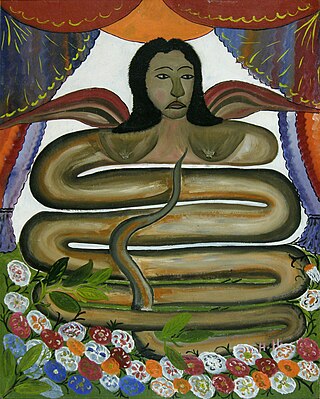
Lwa, also called loa, are spirits in the African diasporic religion of Haitian Vodou and Dominican Vúdu. They have also been incorporated into some revivalist forms of Louisiana Voodoo. Many of the lwa derive their identities in part from deities venerated in the traditional religions of West Africa, especially those of the Fon and Yoruba.

Obeah, also spelled Obiya or Obia, is a broad term for African diasporic religious, spell-casting, and healing traditions found primarily in the former British colonies of the Caribbean. These practices derive much from West African traditions but also incorporate elements of European and South Asian origin. Many of those who practice these traditions avoid the term Obeah due to the word's pejorative connotations in many Caribbean societies.
Kumina is an Afro-Jamaican religion. Kumina has practices that include secular ceremonies, dance and music that developed from the beliefs and traditions brought to the island by Kongo enslaved people and indentured labourers, from the Congo region of West Central Africa, during the post-emancipation era. It is mostly associated with the parish of St. Thomas in the east of the island. However, the practice spread to the parishes of Portland, St. Mary and St. Catherine, and the city of Kingston.

Phyllis Byam Shand Allfrey was a West Indian writer, socialist activist, newspaper editor and politician of the island of Dominica in the Caribbean. She is best known for her first novel, The Orchid House (1953), based on her own early life, which in 1991 was turned into a Channel 4 television miniseries of the same name in the United Kingdom.
The Orchid House is the title of:
The Orchid House is a four-part television serial that first aired on British television's Channel 4 from 21 February to 14 March 1991, directed by Horace Ové and produced by Malcolm Craddock. Its cast featured Diana Quick, Madge Sinclair, Nigel Terry, Elizabeth Hurley, Kate Buffery and Frances Barber, and was based on Phyllis Shand Allfrey's only novel of the same name.
Lennox Honychurch is a Dominican historian and politician. He wrote 1975's The Dominica Story: A History of the Island, the 1980s textbook series The Caribbean People, and the 1991 travel book Dominica: Isle of Adventure. Also an artist and a curator, he was largely responsible for compiling the exhibit information for The Dominica Museum in Roseau. Honychurch is the grandson of writer and politician Elma Napier.
Emmanuel Christopher Loblack OBE was a Dominican trade unionist and politician.
Marie-Thérèse Colimon-Hall, was a Haitian writer.

Espiritismo is a term used in Latin America and the Caribbean to refer to the popular belief that evolved and less evolved spirits can affect health, luck and other aspects of human life.
Gordon Alan Gebert Jr. is an American former child actor, architect, and professor predominantly known for playing Janet Leigh's son in Holiday Affair and for smaller roles. In adulthood, he trained as an architect and has taught at the City College of New York.
A series of workplace disturbances, strikes, and riots broke out across the British West Indies in the period between 1934 and 1939. These began as the Great Depression wore on and ceased on the eve of World War II. The unrest served to highlight inequalities of wealth, led the British government to attempt a solution to the problem, and in some cases spurred the development of indigenous party politics that would lead to self-government and independence in the postwar period.

Paulette Poujol-Oriol was a Haitian educator, actress, dramaturge, feminist and writer. Fluent in French, Creole, English, Spanish, German, and Italian, she contributed to Haitian arts and literature, and founded Picolo Teatro, a performing arts school for children. She has been recognized as one of Haiti's leading literary figures as well as one of the most active players in Haiti's feminist movement.

Florence Daysh, OBE (1908–1979) was a Barbadian social worker and politician. In 1954, she was appointed to the Legislative Council of Barbados and then in 1958, she was elected to serve in the West Indies Federation, one of only two women. In addition to her social welfare activities, Daysh actively worked to improve women's rights and served as the president of the Caribbean Women's Association in the 1960s. She was appointed an Officer of the Order of the British Empire in 1957.
Lizabeth Paravisini-Gebert is a Puerto Rican academic who specializes in research of the Caribbean. She holds the Sarah Tod Fitz Randolph Distinguished Professor Chair at Vassar College.
Polly Pattullo Hon. FRSL is a British author, journalist, editor and publisher, who co-founded in 1998 the independent publishing company Papillote Press, based in Dominica, and London, England. Her writing has appeared in such publications as The Guardian, The Observer, Caribbean Insight, and Caribbean Beat, and she is the author or editor of several books, among them Last Resorts: the Cost of Tourism in the Caribbean (1996) and Your Time is Done Now: Slavery, Resistance and Defeat: the Maroon Trials of Dominica 1813–14 (2015).
In the Cuban religion of Santería, omiero, also known as purificacíon de santo, is a liquid used in various ritual acts.
Santería is an Afro-Cuban religion that arose in the 19th century.
J. R. Ralph Casimir was a Dominican poet, editor, journalist and bookseller. A pioneering Caribbean pan-Africanist, he was a founding member of Marcus Garvey's Universal Negro Improvement Association (UNIA), organising its Dominica branch. Casimir also compiled Dominica's first poetry anthologies.






